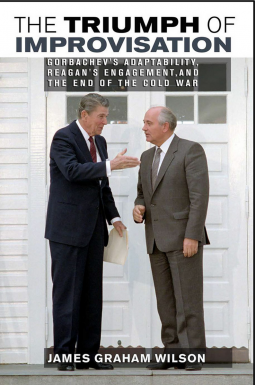
The Triumph of Improvisation
Gorbachev's Adaptability, Reagan's Engagement, and the End of the Cold War
by James Graham Wilson; James Wilson
This title was previously available on NetGalley and is now archived.
Send NetGalley books directly to your Kindle or Kindle app
1
To read on a Kindle or Kindle app, please add kindle@netgalley.com as an approved email address to receive files in your Amazon account. Click here for step-by-step instructions.
2
Also find your Kindle email address within your Amazon account, and enter it here.
Pub Date Feb 25 2014 | Archive Date Feb 25 2014
Description
In The Triumph of Improvisation, James Graham Wilson takes a long view of the end of the Cold War, from the Soviet invasion of Afghanistan in December 1979 to Operation Desert Storm in January 1991. Drawing on deep archival research and recently declassified papers, Wilson argues that adaptation, improvisation, and engagement by individuals in positions of power ended the specter of a nuclear holocaust. Amid ambivalence and uncertainty, Mikhail Gorbachev, Ronald Reagan, George Shultz, and George H. W. Bush—and a host of other actors—engaged with adversaries and adapted to a rapidly changing international environment and information age in which global capitalism recovered as command economies failed.
Eschewing the notion of a coherent grand strategy to end the Cold War, Wilson paints a vivid portrait of how leaders made choices; some made poor choices while others reacted prudently, imaginatively, and courageously to events they did not foresee. A book about the burdens of responsibility, the obstacles of domestic politics, and the human qualities of leadership, The Triumph of Improvisation concludes with a chapter describing how George H. W. Bush oversaw the construction of a new configuration of power after the fall of the Berlin Wall, one that resolved the fundamental components of the Cold War on Washington’s terms.
Advance Praise
“The Triumph of Improvisation is an important book. James Graham Wilson’s research is both deep and broad—in a wide range of archival, online, and published sources from several different countries. Much of this material has not been tapped by previous scholars. The writing is accomplished, the narrative smooth, the organization effective, and the analysis sophisticated.”—Robert J. McMahon, Ralph D. Mershon Distinguished Professor of History, The Ohio State University, author of The Limits of Empire: The United States and Southeast Asia since World War II
“I can think of few if any books that so comprehensively describe White House policymaking toward the Soviets, with an eye toward Reagan's confounding leadership style, as The Triumph of Improvisation. James Graham Wilson's impressive archival work really shines through in his analysis of the Reagan years.”—Jeffrey A. Engel, Southern Methodist University, author of The China Diary of George H. W. Bush: The Making of a Global President
Available Editions
| EDITION | Other Format |
| ISBN | 9780801452291 |
| PRICE | $29.95 (USD) |




